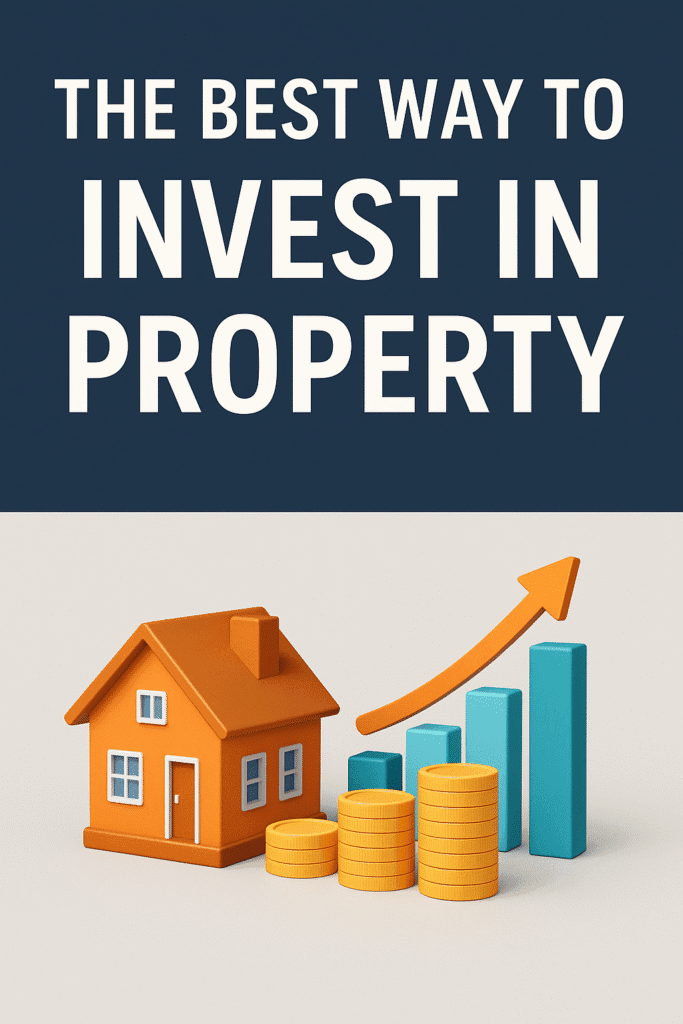Real estate has long been considered one of the safest and most rewarding investment options. But with so many choices available today, what is the best way to invest in property? This guide breaks it down—step-by-step—helping you make informed, profitable decisions in 2025 and beyond.
🎯 Define Your Real Estate Investment Goals
Before you invest, define your personal goals:
- ✅ Cash flow vs. long-term appreciation
- ✅ Passive vs. active management
- ✅ Short-term gains vs. generational wealth
Your strategy will differ based on whether you’re looking for monthly rental income or long-term property appreciation.

🏘️ Choose the Right Type of Property Investment
Each type of property comes with pros and cons. Choose based on your capital, risk tolerance, and market knowledge.
🏡 Residential Real Estate
- Ideal for beginners
- Lower entry costs
- Steady rental demand
🏢 Commercial Properties
- High return potential
- More complex management
- Often requires large capital
🏖️ Vacation Rentals
- High profits in tourist zones
- Seasonal and regulated
🏦 REITs (Real Estate Investment Trusts)
- Perfect for passive investors
- Traded like stocks
- No physical property ownership
📊 Master Market Research
Location is king. Even a mediocre property in a great area will outperform a luxury one in a declining market.
Key Market Indicators:
- 📈 Population & job growth
- 🚆 Infrastructure & public transit plans
- 🏢 Low vacancy rates
- 💰 High rental yield vs. property price
Use platforms like Zillow, Redfin, or Numbeo to evaluate neighborhood trends.
💸 Understand Property Financing Options
Financing can supercharge your returns—but it must be handled wisely.
Popular Methods:
- Conventional mortgage
- FHA or first-time buyer loans
- Buy-to-let mortgages (UK)
- Owner financing
- Hard money loans (for flips)
💡 Tip: Aim for properties where rent covers mortgage + expenses with positive cash flow.
🔄 Buy-and-Hold vs. Fix-and-Flip
🏠 Buy-and-Hold
- Steady rental income
- Long-term wealth building
- Passive income with property management
🔨 Fix-and-Flip
- High profit (but high risk)
- Requires renovation knowledge
- Market timing critical
Most beginners find success with buy-and-hold strategies.
🧾 Use Real Estate Tax Benefits
Property investing offers generous tax advantages:
- ✅ Depreciation deductions
- ✅ Mortgage interest deductions
- ✅ Capital gains tax deferral (e.g., 1031 Exchange in the U.S.)
- ✅ Write-offs on repairs, property management, and more
💡 Always consult a tax advisor to legally maximize your return.
👥 Build a Reliable Property Investment Team
Even solo investors benefit from a good support system:
- 🧑💼 Real estate agent
- 🧮 Accountant/tax consultant
- 🔧 Contractor
- 🧑💻 Property manager (for rentals)
- 🏦 Mortgage broker
A trustworthy team helps you scale efficiently and avoid pitfalls.
📈 Track, Improve, and Grow Your Portfolio
Smart investors don’t stop at one property. They optimize and expand.
Tools for Portfolio Management:
- Stessa – Free property performance tracking
- Buildium – All-in-one landlord solution
- AppFolio – Enterprise-level property management
Use equity from one property to finance another, creating a real estate snowball effect.
🏁 Final Thoughts: What’s the Best Way to Invest in Property?
The best way to invest in property ultimately depends on your personal goals, risk tolerance, and financial situation. For most beginners, buying a rental property in a high-growth area or investing in REITs offers a smart, low-barrier entry into real estate.
With the right mindset, strategy, and team, property investment can become your most powerful tool for achieving financial independence

